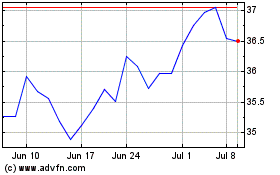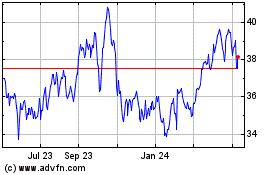BP's Gulf-Spill Tab Hits $62 Billion -- WSJ
July 15 2016 - 3:03AM
Dow Jones News
By Michael Amon and Tapan Panchal
BP PLC said its costs from the deadly 2010 Gulf of Mexico oil
spill would rise by an additional $5.2 billion and ultimately cost
$61.6 billion to put one of the worst environmental disasters in
U.S. history behind it.
The British oil giant said on Thursday the pretax charge for its
second quarter likely would be the last from the Deepwater Horizon
accident to have a "material impact" on its financial performance,
signaling an end to six years of mounting costs that humbled one of
the world's largest energy companies.
Until now, BP had said it was impossible to estimate the
ultimate corporate cost of the Macondo well blowout, which killed
11 workers and released 3.2 million barrels of oil into the Gulf of
Mexico over almost three months. The spill upended the Gulf fishing
industry, decimated the region's wildlife and prompted a massive
cleanup effort.
BP's costs are much larger than the fines levied on individual
banks involved in the subprime mortgage crisis last decade or the
1989 Exxon-Valdez spill, which cost the U.S. company $4.3
billion.
"I know of no other more expensive man-made corporate disaster,"
said Daniel Jacobs, a former Justice Department environmental
lawyer who is writing a book on the disaster. "The number is
huge."
Further Deepwater Horizon costs will be treated as an ordinary
part of BP's business rather than a lingering uncertainty, the
London-based firm said.
Thursday's disclosure came about a month after it resolved one
of the last pieces of litigation arising from spill, agreeing to
pay investors $175 million to settle allegations it failed to fully
disclose the business risks. That came on top of a roughly $20
billion agreement with state and federal governments -- among the
largest corporate penalties in U.S. history -- to resolve all state
and federal claims relating to the spill.
Brian Gilvary, BP's finance chief, said the company had made
"significant progress" over the past few months in resolving the
thicket of litigation related to the spill.
"Today we can estimate all the material liabilities remaining
from the incident," Mr. Gilvary said. "Importantly, we have a clear
plan for managing these costs and it provides our investors with
certainty going forward."
BP has struggled to pivot from a disaster that has drained the
company of resources for six years and forced it to retrench into a
period of cost savings and downsizing long before oil prices began
a steep descent in 2014. It has sold more than $40 billion in
assets since the spill.
The charge will affect BP's profits for June 30 quarter, which
will be released on July 26. After tax, the charge will amount to
about $2.5 billion, and the company estimates the total post-tax
bill to be $44 billion.
The relentless fallout from the massive oil spill has dragged on
the company's efforts to forge a new strategy. BP executives have
long been able to blame the Macondo disaster for poor financial
performance but will now be expected soon to put forward a plan to
recharge its ambitions.
Payment of the federal settlement is scheduled to begin later
this year, with an average distribution of around $1.1 billion
annually over a period of 18 years. The company has said asset
sales will cover the cost of settlement payments.
--Lynn Cook contributed to this article.
Write to Michael Amon at michael.amon@wsj.com and Tapan Panchal
at Tapan.Panchal@wsj.com
(END) Dow Jones Newswires
July 15, 2016 02:48 ET (06:48 GMT)
Copyright (c) 2016 Dow Jones & Company, Inc.
BP (NYSE:BP)
Historical Stock Chart
From Mar 2024 to Apr 2024

BP (NYSE:BP)
Historical Stock Chart
From Apr 2023 to Apr 2024
